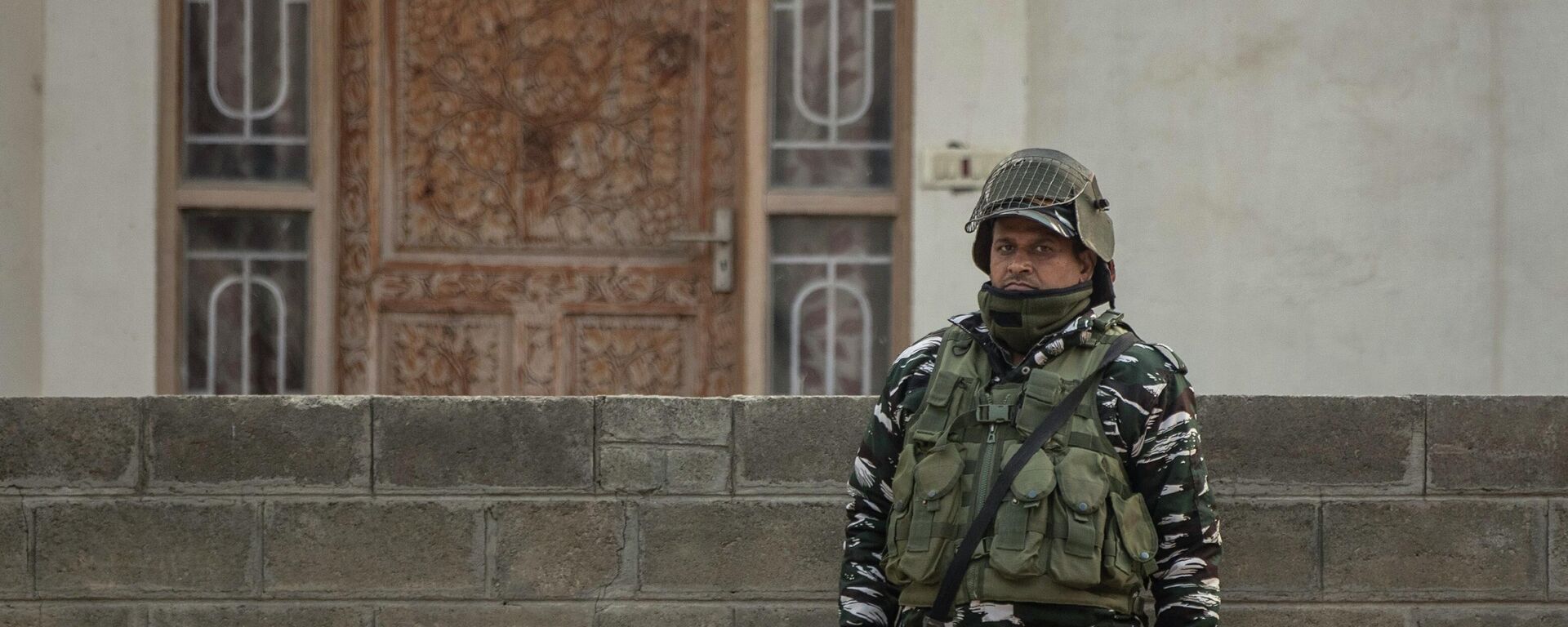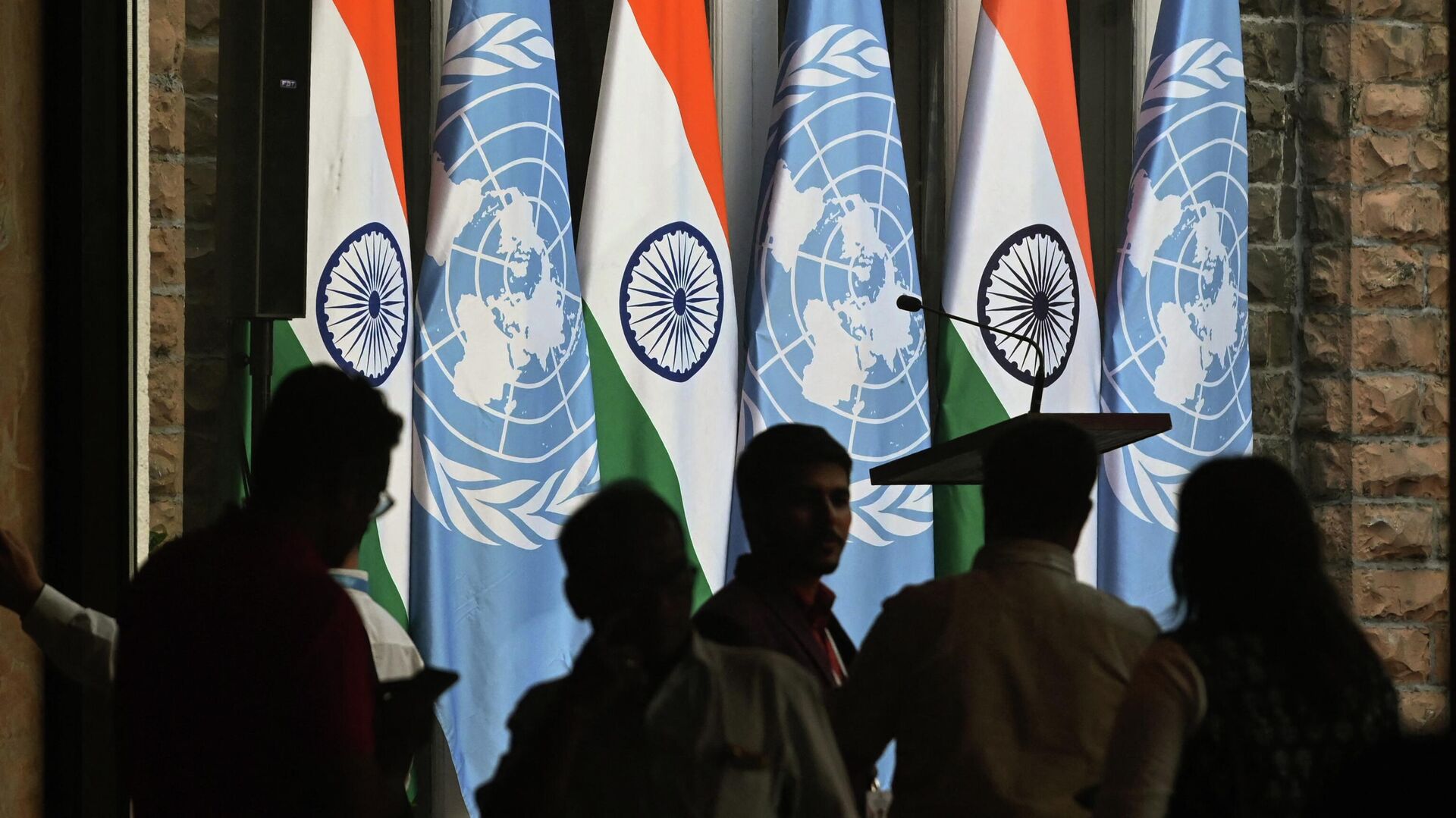https://sputnikglobe.com/20221028/india-flags-concerns-over-politicization-of-un-sanctions-1102793222.html
India Flags Concerns Over Politicization of UN Sanctions
India Flags Concerns Over Politicization of UN Sanctions
Sputnik International
India has been involved in a diplomatic spat with China over Beijing's hold on several proposals moved by Delhi to get Pakistani terrorists listed by the UN... 28.10.2022, Sputnik International
2022-10-28T12:42+0000
2022-10-28T12:42+0000
2022-12-08T18:03+0000
india
china
unsc
sanction
mumbai
subrahmanyam jaishankar
kashmir
terrorism
terror attack
pakistan
https://cdn1.img.sputnikglobe.com/img/07e6/0a/1c/1102796434_0:321:3071:2048_1920x0_80_0_0_baa36e40d74ea29825ef6ffc19aaedcb.jpg
India on Friday warned the UN members against politicizing the UNSC sanctions against terrorists, arguing that it dents the credibility of the sanctions committee.Speaking at a special meeting of the UNSC counter-terrorism committee in Mumbai, Indian Foreign Minister S. Jaishankar said that “the key conspirators and planners of the 26/11 Mumbai terror attacks continue to remain protected and unpunished.”The minister’s remarks come days after China put on hold a proposal moved by India and the US to blacklist Pakistan-based Lashkar-e-Taiba (LeT)** terrorist Shahid Mahmood. LeT was behind the November 26, 2008 Mumbai terror attacks.This was the fourth proposal since June that has been placed on "technical hold" by China, which justifies its actions by saying that these are "always consistent with relevant rules and procedures." Highlighting the diversified funding portfolio of terror groups, Jaishankar asked countries to find innovative solutions to tackle financing from new and emerging technologies such as virtual currencies.The Ministry of Home Affairs said that terror bases across the Indo–Pak border went down to around 200 in mid-2021 from 600 in 2018, when FATF put its western neighbor on the “grey list.”FATF removed Pakistan from the list of countries under “increased monitoring” — also known as the “grey List” -- on October 21 as the Paris-based intergovernmental organization was satisfied with the measures taken by Islamabad to strengthen effectiveness of anti-money laundering and counter-terrorist financing measures.*a terrorist organization banned in Russia and many other states**banned in Russia
https://sputnikglobe.com/20221018/narrative-war-militants-in-kashmir-target-civilians-to-sow-panic--earn-more-news-coverage-1102009183.html
china
mumbai
kashmir
pakistan
Sputnik International
feedback@sputniknews.com
+74956456601
MIA „Rossiya Segodnya“
2022
Rishikesh Kumar
https://cdn1.img.sputnikglobe.com/img/07e4/08/04/1080055820_0:0:388:389_100x100_80_0_0_40018ee210946d65d49ffba4f4c008e1.jpg
Rishikesh Kumar
https://cdn1.img.sputnikglobe.com/img/07e4/08/04/1080055820_0:0:388:389_100x100_80_0_0_40018ee210946d65d49ffba4f4c008e1.jpg
News
en_EN
Sputnik International
feedback@sputniknews.com
+74956456601
MIA „Rossiya Segodnya“
Sputnik International
feedback@sputniknews.com
+74956456601
MIA „Rossiya Segodnya“
Rishikesh Kumar
https://cdn1.img.sputnikglobe.com/img/07e4/08/04/1080055820_0:0:388:389_100x100_80_0_0_40018ee210946d65d49ffba4f4c008e1.jpg
india, china, unsc, sanction, mumbai, subrahmanyam jaishankar, kashmir, terrorism, terror attack, pakistan
india, china, unsc, sanction, mumbai, subrahmanyam jaishankar, kashmir, terrorism, terror attack, pakistan
India Flags Concerns Over Politicization of UN Sanctions
12:42 GMT 28.10.2022 (Updated: 18:03 GMT 08.12.2022) India has been involved in a diplomatic spat with China over Beijing's hold on several proposals moved by Delhi to get Pakistani terrorists listed by the UN Security Council Daesh and Al Qaeda* Sanctions Committee.
India on Friday warned the UN members against politicizing the UNSC sanctions against terrorists, arguing that it dents the credibility of the sanctions committee.
Speaking at a special meeting of the UNSC counter-terrorism committee in Mumbai, Indian Foreign Minister S. Jaishankar said that “the key conspirators and planners of the
26/11 Mumbai terror attacks continue to remain protected and unpunished.”
“Objective and evidence-based proposals for the listing of terrorist groups, especially those that curb their access to financial resources, must be seen through,” the Indian minister emphasized.
The minister’s remarks come days after China put on hold a proposal moved by India and the US to blacklist Pakistan-based Lashkar-e-Taiba (LeT)** terrorist Shahid Mahmood. LeT was behind the November 26, 2008 Mumbai terror attacks.
This was the fourth proposal since June that has been placed on "technical hold" by China, which justifies its actions by saying that these are "always consistent with relevant rules and procedures."
Highlighting the diversified funding portfolio of terror groups, Jaishankar asked countries to find innovative solutions to tackle financing from new and emerging technologies such as virtual currencies.

18 October 2022, 14:35 GMT
The Ministry of Home Affairs said that terror bases across the Indo–Pak border went down to around 200 in mid-2021 from 600 in 2018, when FATF put its western neighbor on the
“grey list.”“The moment the talks started that the grey listing is about to end, which has ended now, it (terrorist bases) has gone up again by 50 percent. And we are expecting more scalable and more attacks on hard targets, and much more trouble (in Kashmir),” Safi Rizvi, a senior official of the Indian Home Ministry, said.
FATF removed Pakistan from the list of countries under “increased monitoring” — also known as the “grey List” -- on October 21 as the Paris-based intergovernmental organization was satisfied with the measures taken by Islamabad to strengthen effectiveness of anti-money laundering and counter-terrorist financing measures.
*a terrorist organization banned in Russia and many other states



